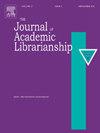Vibe check: Unmuting the possible effects of emergency remote teaching on first year students research
IF 2.5
3区 管理学
Q2 INFORMATION SCIENCE & LIBRARY SCIENCE
引用次数: 0
Abstract
Background
Through previous literature we know students has experienced a wide variety of emotions throughout their research (Blocksidge & Primeau, 2024, Bostik, 1992; Onwuegbuzie, Jiao, & Bostick, 2004; McAfee, 2018), but the impact emergency remote teaching has had on those emotions is yet to be explored, despite knowing that students are encountering more mental health challenges than pre-pandemic (Pasquini & Keeter, 2022; Schaeffer, 2022). Having a robust data set of first year students from 2019 we set out to identify what has changed post-emergency remote teaching. Our goal is to create a set of findings for others to use to create their own evidence-based practices.
Methods
In 2019 and 2023 all first-year students on a large regional campus of a school in the Midwest had the opportunity to participate in a survey as well as interviews. Interviews were recorded and then transcribed, allowing us to move to using a grounded theory approach to coding.
Results
We discovered when comparing our 2019 and 2023 results that the emotional codes had a change with an increased expression of frustrations by 15 % and a slight increase of 35 % of Problem-Solving Persistence. When exploring the data related to research activities, we found a 57 % increase in students looking to find a source a different way with a 59 % decrease in students giving up on a source or a 46 % decreased in finding a completely different source. Additionally, there was a 34 % increase in ambiguous language in reference to evaluation.
Conclusion
While first-year students are still using ambiguous language when evaluating sources and express frustration with roadblocks to finding information, they are giving up on sources less, and becoming more persistent when trying multiple methods to find the exact source they believe they need. More research is still needed but this preliminary work shows that there have been changes in their information behaviors, ones that can't be dismissed when evaluating and revising our own practices.
氛围检查:消除紧急远程教学对一年级学生研究的可能影响
背景通过以前的文献,我们知道学生在整个研究过程中经历了各种各样的情绪(Blocksidge & Primeau, 2024, Bostik, 1992; Onwuegbuzie, Jiao, & Bostick, 2004; McAfee, 2018),但紧急远程教学对这些情绪的影响还有待探索,尽管我们知道学生遇到的心理健康挑战比大流行前更多(Pasquini & Keeter, 2022; Schaeffer, 2022)。有了 2019 年一年级新生的强大数据集,我们开始着手确定紧急状况后远程教学发生了哪些变化。我们的目标是创建一套研究结果,供其他人用于创建他们自己的循证实践。方法在 2019 年和 2023 年,中西部一所学校的一个大型区域校园的所有一年级新生都有机会参与调查和访谈。访谈被记录下来,然后转录,使我们能够转而使用基础理论方法进行编码。结果我们在比较2019年和2023年的结果时发现,情感编码发生了变化,挫折感的表达增加了15%,解决问题的坚持度略微增加了35%。在探究与研究活动相关的数据时,我们发现寻求不同方法寻找资料来源的学生增加了 57%,放弃资料来源的学生减少了 59%,找到完全不同资料来源的学生减少了 46%。结论虽然一年级学生在评估信息来源时仍然使用含糊不清的语言,并对查找信息时遇到的障碍表示沮丧,但他们放弃信息来源的情况减少了,而且在尝试多种方法查找他们认为需要的确切信息来源时变得更加坚持不懈。我们还需要进行更多的研究,但这一初步研究表明,他们的信息行为已经发生了变化,我们在评估和修正自己的做法时不能忽视这些变化。
本文章由计算机程序翻译,如有差异,请以英文原文为准。
求助全文
约1分钟内获得全文
求助全文
来源期刊

Journal of Academic Librarianship
INFORMATION SCIENCE & LIBRARY SCIENCE-
CiteScore
5.30
自引率
15.40%
发文量
120
审稿时长
29 days
期刊介绍:
The Journal of Academic Librarianship, an international and refereed journal, publishes articles that focus on problems and issues germane to college and university libraries. JAL provides a forum for authors to present research findings and, where applicable, their practical applications and significance; analyze policies, practices, issues, and trends; speculate about the future of academic librarianship; present analytical bibliographic essays and philosophical treatises. JAL also brings to the attention of its readers information about hundreds of new and recently published books in library and information science, management, scholarly communication, and higher education. JAL, in addition, covers management and discipline-based software and information policy developments.
 求助内容:
求助内容: 应助结果提醒方式:
应助结果提醒方式:


